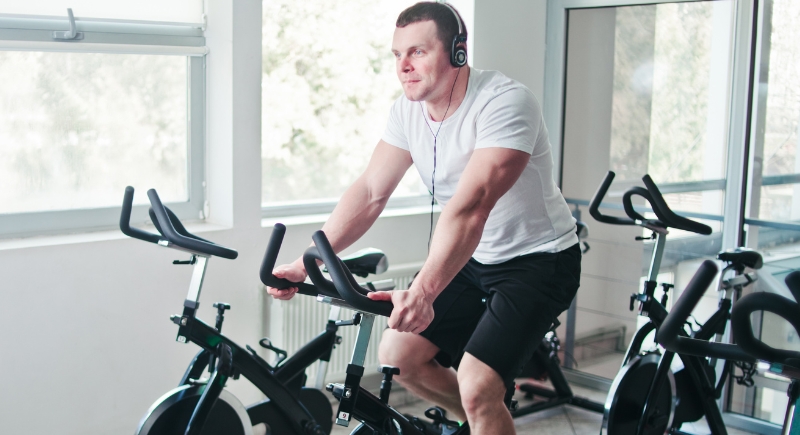5 Super-Easy Health Tips Every Man Over 40 Needs to Know
Your 40s can feel stable, but your body quietly changes. Heart risks rise, muscles lose strength faster, and stress takes a bigger toll. These years matter because small decisions shape how you feel in your 50s and 60s. So, here are some health tips backed by research, trusted by doctors, and realistic to follow, that you can start using right away.
Manage Stress Before It Hurts Your Heart

Credit: Getty Images
Studies show that stress hormones raise inflammation and drive blood pressure higher, which increases the likelihood of heart disease in men over 40. Managing tension through daily walks or focused breathing can interrupt this process. Many men wait to address this issue only after they experience warning signs such as ongoing fatigue or sudden chest discomfort.
Keep Doctor Visits on Your Calendar

Credit: Getty Images
An annual physical can feel unnecessary when nothing seems wrong, but medical data shows otherwise. Those who skip routine care discover conditions late, when treatments become harder. This is why a yearly appointment is necessary, and it provides a clear record of your health trends.
Pay Attention to Your Waist Size

Credit: Getty Images
Carrying extra weight around the middle places continuous strain on your organs and makes your heart work harder every day. This buildup of abdominal fat interferes with how your body handles insulin, which can lead to type 2 diabetes. Ignoring it also raises the chance of clogged arteries.
Follow Recommended Screening Guidelines

Credit: Canva
Screenings feel like a formality, but they uncover issues before symptoms interfere with life. Medical organizations recommend cholesterol tests at least every five years, and blood glucose tests for anyone with extra weight or family history. Colon cancer tests now start at 45 for most men.
Stay Active Through Strength and Cardio

Credit: Canva
It is natural for males to lose about one percent of muscle each year after four decades, especially if they stop challenging their bodies. Strength sessions help maintain lean tissue, and cardio keeps the heart efficient. A simple plan of resistance training twice a week, combined with brisk walks, supports bone density.
Shape Meals Around Whole Foods

Credit: Canva
Build each meal around vegetables, whole grains, and lean sources of protein such as fish, poultry, or beans. Include foods high in omega‑3, like salmon or walnuts, and replace processed snacks with fresh options to cut excess salt and additives. These adjustments support healthier blood pressure, improve cholesterol profiles, and reduce hidden water retention.
Make Sleep A Non-Negotiable

Credit: pexels
Skipping sleep in favor of late work or streaming habits reduces hormone balance and slows recovery. Lack of rest also increases cortisol levels, which affects weight and arterial pressure. Studies following thousands of adults found that those who slept under six hours regularly developed chronic conditions over time.
Recognize Mental Health Signals Early

Credit: Getty Images
Ignoring mood changes usually allows depression or anxiety to deepen, makes recovery take longer, and calls for intensive treatment. Sleep disruptions also become more frequent, appetite shifts lead to unwanted weight changes, and focus at work or home declines.
Strengthen Your Core

Credit: pexels
A strong core supports more than athletic performance. It stabilizes the spine, reduces pressure on discs, and prevents small injuries during routine lifting or bending. Physical therapists typically assign core exercises to adults recovering from back pain because research shows faster improvements in this direction.
Drink Enough Water Every Day

Credit: pexels
You may not realize it, but males over 40 overlook hydration because they think thirst will guide them. However, those signals weaken with age. A reusable bottle within reach helps maintain steady intake. After several weeks, joints feel less stiff, and energy becomes consistent through the afternoon.
Talk About Intimate Health Concerns

Credit: Getty Images
Changes in intimate health go unspoken because of discomfort or uncertainty, but they can point to other medical conditions. Difficulties maintaining arousal may indicate circulation problems or early diabetes. Left unaddressed, these issues can worsen and begin to affect energy levels, sleep patterns, and overall cardiovascular health.
Discuss Scans for Prostate and Colon Health

Credit: pexels
Research has shifted in recent years to recommend earlier colon surveys. Men with a family history should consider discussions even sooner. Prostate health also benefits from timely testing in certain groups. Delaying these conversations paves the way for later-stage discoveries that require aggressive treatments.
Fit Activity into Routine Tasks

Credit: pexels
Start with taking the stairs whenever you can, carrying your own grocery bags, and walking briskly during short errands. These simple actions raise your heart rate and strengthen muscles without needing scheduled workouts. They gradually burn calories and improve endurance throughout the day.
Identify And Fill Nutrition Gaps

Credit: Getty Images
According to surveys, various men consume less fiber, vitamin D, and calcium than recommended. That gap increases risk for bone thinning, digestive issues, and cholesterol problems. Simple additions like a handful of almonds, a serving of beans, or a leafy green salad close those gaps.
Build Habits You Can Maintain

Credit: iStockphoto
Failing to maintain a steady routine leads to skipped checkups, irregular meals, and long gaps without physical activity. Such lapses contribute to rising arterial tension, weight gain, and reduced stamina that make daily tasks feel harder. Sustainable change comes through habits repeated often enough to feel automatic.